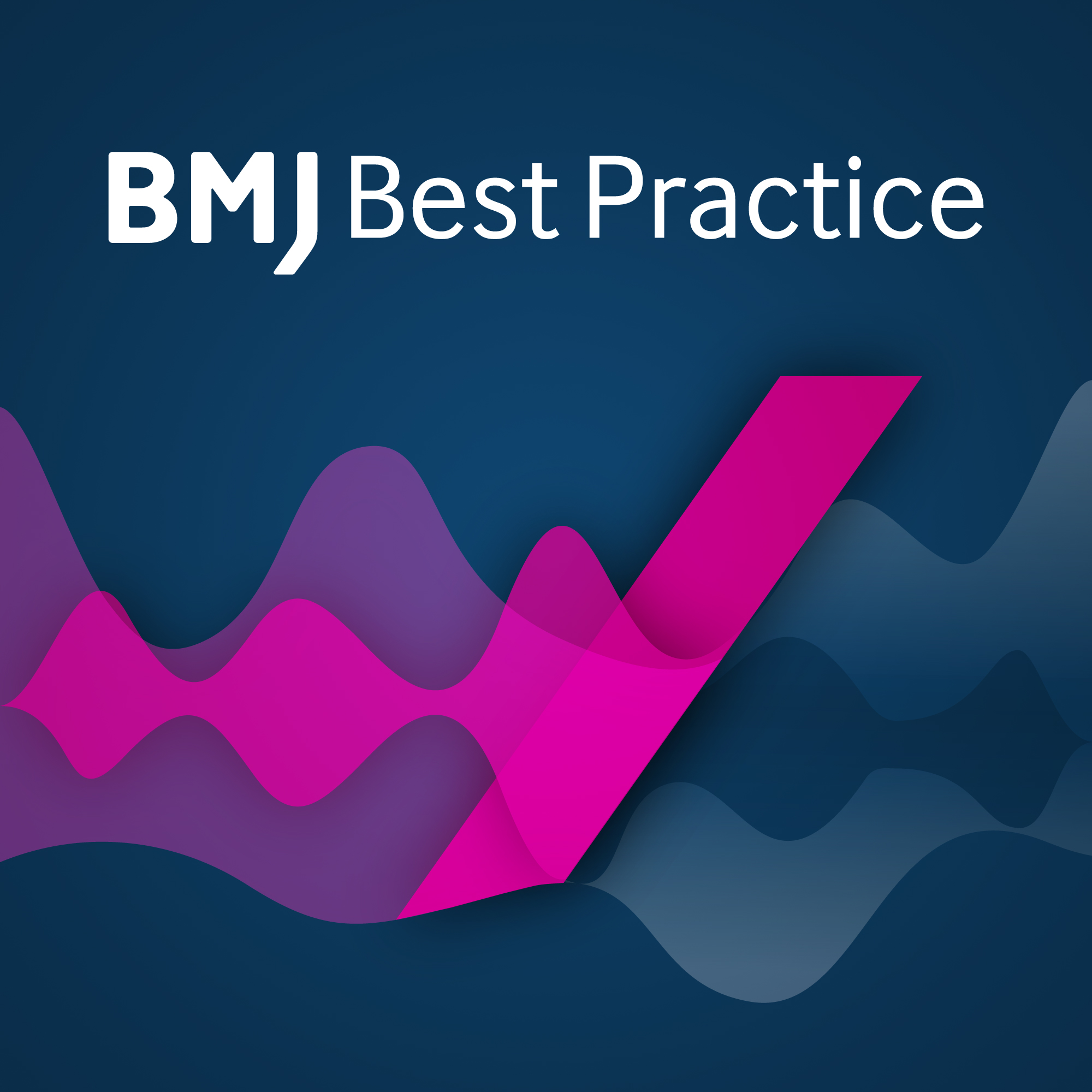

BMJ Best Practice Podcast
BMJ Group
The BMJ Best Practice podcast publishes interviews with clinical experts, aimed at healthcare professionals and students with an interest in keeping up to date with the latest scientific developments, evidence-based medicine and guidelines.
BMJ Best Practice is ranked one of the best clinical decision support tools for health professionals worldwide.* Structured around the clinical workflow and updated daily, BMJ Best Practice uses the latest evidence-based research, guidelines and expert opinion to offer step-by-step guidance on diagnosis, prognosis, treatment and prevention.
bestpractice.bmj.com
*Kwag KH, González-Lorenzo M, Banzi R, Bonovas S, Moja L. Providing Doctors With High-Quality Information: An Updated Evaluation of Web-Based Point-of-Care Information Summaries
The purpose of this podcast is to educate and to inform. The content of this podcast does not constitute medical advice and it is not intended to function as a substitute for a healthcare practitioner’s judgement...
BMJ Best Practice is ranked one of the best clinical decision support tools for health professionals worldwide.* Structured around the clinical workflow and updated daily, BMJ Best Practice uses the latest evidence-based research, guidelines and expert opinion to offer step-by-step guidance on diagnosis, prognosis, treatment and prevention.
bestpractice.bmj.com
*Kwag KH, González-Lorenzo M, Banzi R, Bonovas S, Moja L. Providing Doctors With High-Quality Information: An Updated Evaluation of Web-Based Point-of-Care Information Summaries
The purpose of this podcast is to educate and to inform. The content of this podcast does not constitute medical advice and it is not intended to function as a substitute for a healthcare practitioner’s judgement...
Episodes
Mentioned books

13 snips
Jun 17, 2024 • 22min
Acute otitis media
Dr. Carlos Armengol, a pediatrician from Pediatric Associates of Charlottesville, shares vital insights on acute otitis media, a condition affecting over 80% of children. He discusses effective diagnosis techniques and the importance of correlating visual findings with medical history. The conversation delves into pain management strategies and the cautious use of antibiotics, particularly in older children. Special attention is given to managing otitis media in those with type 1 diabetes and immunocompromised children, highlighting the complexities involved in their treatment.

9 snips
Jun 3, 2024 • 19min
Animal bites
Dr. Oliver Spencer discusses the prevalence and seriousness of animal bites, with a focus on dog bites in the UK. The podcast covers assessment processes, wound examination, and personalized management strategies. Tips on preventing animal bites and understanding human bite risks are also highlighted.

17 snips
May 21, 2024 • 28min
Burns
A podcast episode discussing the management of burns, highlighting the prevalence and complications of burns injuries. Topics include diagnosing and managing burns, tetanus assessment, pain management, tissue removal techniques, and debunking common myths about burn treatment.

16 snips
May 8, 2024 • 29min
COPD: an update on diagnosis and management
Neil Greening, an Associate Professor and Honorary Consultant Physician at the Institute for Lung Health, delves into the complexities of Chronic Obstructive Pulmonary Disease (COPD). He discusses the alarming rates of exacerbations and mortality, critical diagnostics, and the importance of personalized care. Greening highlights the use of nebulizers and the safety of oxygen therapy, while addressing the challenges of managing COPD alongside comorbidities like diabetes. Common misconceptions about COPD management and the evolving role of telemedicine are also explored.

11 snips
Apr 26, 2024 • 23min
Syncope
Shamai Grossman, Associate Professor of Medicine and Emergency Medicine at Harvard Medical School, dives into the complexities of syncope. He highlights its prevalence, accounting for significant emergency visits. Grossman emphasizes the importance of history and witness accounts in diagnosis, warns against over-testing, and discusses effective management strategies, including risk assessment and monitoring options. He also addresses common misconceptions and offers insights on managing syncope in specific populations, such as pregnant women and the elderly.

13 snips
Feb 26, 2024 • 26min
Sepsis in adults
Delve into the intricacies of diagnosing sepsis in adults, including immune responses and identifying sepsis in immunocompromised patients. Learn about tailoring diagnostic tests, promptly administering antibiotics, managing comorbidities, and addressing common concerns among trainees. Explore challenges in sepsis diagnosis and the importance of education for enhanced patient care.

17 snips
Feb 12, 2024 • 23min
Acne vulgaris
Professor John Barbieri, Assistant Professor of Dermatology, discusses the causes and symptoms of acne, the importance of accurate diagnosis and treatment, the benefits and precautions of using isotretinoin, dispigmentation as a side effect, and the role of diet in acne.

15 snips
Jan 23, 2024 • 25min
Cervical spine injury
Learn about cervical spine injuries, their diagnosis, and management in this podcast. Mich, an expert in the field, discusses the importance of accurate diagnosis, the use of cervical collars, and the role of neurological assessment. The podcast also highlights the challenges in diagnosing these injuries and the management of cervical spinal cord injuries in older individuals with medical comorbidities.

7 snips
Jan 9, 2024 • 19min
Croup
Learn about the causes, symptoms, and management of croup in young children. Discover the importance of rapid diagnosis and treatment to prevent complications like pneumonia. Explore the challenges in diagnosing bacterial tracheitis and the use of corticosteroids as the main intervention. Understand the different presentation patterns of croup and how treatment is the same for both types.

6 snips
Dec 18, 2023 • 22min
Frostbite
The podcast discusses the diagnosis and management of frostbite, including the importance of proper treatment and the use of vasodilators or thrombolic agents. It also highlights the pitfalls in managing frostbite, the significance of a team-based approach in managing complex hand injuries, and the drawbacks of providing alcohol to cold and injured individuals. Additionally, it mentions a study conducted during the South Pole Medical Research Expedition comparing weight loss between men and women.


